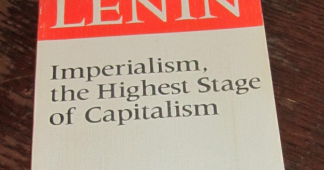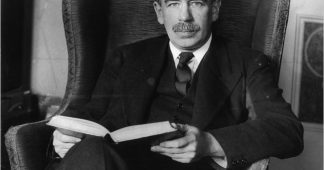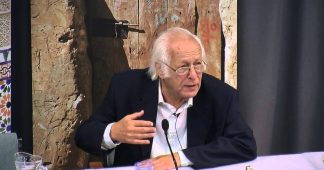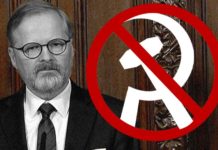A new edition of Rudolf Hilferding’s Finance Capital: A Study of the Latest Phase of Capitalist Development has been published in a new translation and with a useful introduction and notes by Tom Bottomore (Routledge and Kegan Paul, £8.95). It provides an opportunity to consider whether the theories advanced by Hilferding and others have been confirmed in the years since the work was first published in 1910.
Towards the end of the 19th century there was a growing tendency towards the formation of trusts and combines associated with what came to be known as imperialism. Among the other books on the subject there were J.A. Hobson’s Imperialism (1902) and his earlier Evolution of Modern Capitalism, Lenin’s Imperialism: the Highest Stage of Capitalism and L.B. Boudin’s Socialism and War (1916). Later on J.M. Keynes had something to say about it in his General Theory (1936). Hobson held that monopolistic industries restrict output in the home market, in order to raise prices and profits, and therefore have to seek foreign outlets for investment and markets. For this purpose they get governments to colonise foreign territories (Evolution of Modern Capitalism, page 26). Lenin made use of Hobson for his own Imperialism, and gave high praise to much of his works. Keynes saw in Hobson many features of his own theories set out in the General Theory.
Hobson, unlike Lenin but like Keynes, offered a remedy:
“If the whole gain of improved economies passed, either to the workers in wages or to large bodies of investors in dividends, the expansion of demand in the home market would be so great as to give full employment to the productive forces of concentrated capitalism, and there would be no self-accumulating masses of profit . . . demanding external employment.”
Keynes (in Chapter 24) saw “the competitive struggle for markets” as a predominant factor in “the economic causes of war”. But, said Keynes, if governments followed Keynesian policies to increase demand at home and thus maintain full employment, the competitive struggle for markets as a main cause of war, would disappear.
Lenin and Hilferding gave detailed accounts of the supposedly unstoppable growth of monopoly in industry and banking but carried it much further, crediting the banks with dominating industry and the cartels with fixing prices and dividing up world markets among themselves. Lenin wrote: “Cartels become one of the foundations of the whole economic life. Capitalism has been transformed into imperialism.” Hilferding wrote: “An ever-increasing proportion of the capital used in industry is finance capital, capital at the disposition of the banks which is used by the industrialists” (page 225). Lenin quoted and endorsed this. Hilferding (page 368) said that it was only necessary to take over six large Berlin banks to take possession of “the most important spheres of large-scale industry”. It is worth noticing that in the depression of the 1930s most of the big German banks collapsed, or almost did so, along with the industrial companies in which the banks’ money was tied up. Among other forecasts made by Lenin was that because of the dominance of finance capital “there was a decrease in the importance of the Stock Exchange”.
Some social-democrats, including Kautsky, thought that the end result would be “a single world monopoly . . . a universal trust”, followed by socialism. Hilferding thought that this single world monopoly was “thinkable economically, although socially and politically such a state appears unrealisable, for the antagonism of interests . . . would necessarily bring about its collapse”. But Hilferding (page 343) thought that world cartels would result in “longer . . . periods of prosperity” and shorter depressions. The long depression of the 1930s and the long depression since 1979 belie this.
It was Boudin in his Socialism and War who put in its most crude form the theory on imperialism and war. He argued (like Hobson and others) that the turning point was the replacement of such industries as textiles by iron and steel. He wrote (page 64):
“Modern imperialism . . . is the expression of the economic fact that iron and steel have taken the place of textiles as the leading industry of capitalism, and imperialism means war. Textiles, therefore mean peace, iron and steel—war.”
The argument was that exports of textiles and similar consumer goods are paid for at once but iron and steel exported to build railways, factories, ports and so on are long-term investments needing the protection provided by the home government turning importing countries into colonies. Boudin’s theory to explain competition for markets (page 55) was:
“The basis of all capitalist industrial development is the fact that the working class produces not only more than it consumes, but more than society as a whole consumes.”
Therefore, said Boudin, developed countries cannot find markets inside the capitalist world but only on the fringes of capitalism, first in primitive agriculture at home and, when that too is developed, only in the countries not yet developed. These countries themselves develop and have to seek non-existent markets for their “surplus” products.
It is only necessary to look at what actually takes place to see that Boudin’s theory is demonstrably false. The working class do not produce more than society itself consumes. Or rather, they alternately produce more than society currently consumes and then less than society currently consumes. At the onset of a depression stocks pile up of the goods some industries have overproduced for their markets but later on, as recovery begins, stocks run down again, as they did early in 1985. In 1983 British exports totalled £60,534m. According to Boudin this was all “surplus” to demand in the home market. Who then bought the £65,993m of imports that were sold in this country? In the same year, 77 per cent of British exports went to countries officially classified as “developed countries”—which Boudin said was impossible. Hilferding, Lenin and Hobson all failed to allow for the sectional divisions of interest in the capitalist class. Hilferding treated the monopolist industries as representing a united capitalist class.
Certainly the export industries have an interest in getting the government to promote exports. But most capitalists have no such interest. British exports represent under a third of total production; for America and Russia about 10 per cent of total production. At their conference last year the Confederation of British Industries defeated an executive resolution calling on the government to lower the exchange rate of the pound in order to promote exports. The industries making profit by selling imports in the home market, and the industries buying cheap imports rather than pay more for home products, want the exchange rate to be higher, not lower.
At a time when the Thatcher government was declaring that they wanted the pound exchange rate not to fall but to rise, and asking Reagan to help bring it about, the Financial Times published an article (14 January 1985) with the title “Industry Delighted At Fall Of Pound”. It was true only of export industries not having to import raw materials, but in the article there were examples of industries having to import materials which wanted the pound exchange rate to rise and not to fall. The British Steel Corporation told the Financial Times that “every one cent decline in the value of sterling costs us £4 million”.
The failure to recognise sectional capitalist interests applies particularly to monopoly, which raises selling prices and consequently profits for the monopolies and is viewed very differently by the rest of the capitalists, who object to being held to ransom. In the 19th century British government policy towards monopoly was to protect the interests of the rest of the capitalist class by nationalisation, as with telegraphs and telephones. Frederick Engels put the same view in his Socialism, Utopian and Scientific: “. . . no nation will put up with production conducted by trusts, with so barefaced an exploitation of the country by a small band of dividend-mongers”. The same idea was behind the Tory railway nationalisation Act of 1844. It gave the government power to take over the railways and was used as a threat of what would happen if the railway companies continued to use their monopoly to the detriment of the rest of the capitalist class.
But in America the method used was to control monopoly by the Anti-Trust Laws, which have resulted in heavy fines and sometimes imprisonment. American Telephone and Telegraph, controllers of the near-monopoly Bell telephone system and described as the largest and richest corporation in the world, has recently fallen foul of the law and has been broken up into separate organisations, all open to competition. In Britain, the Tory government has gone over to the American system. Along with partial de-nationalisation the Telecommunication services have lost their monopoly and been thrown open to competition. The same applies to bus services. British governments long ago halted further amalgamation of the big commercial banks who now face competition from the development of ordinary banking services by the building societies, the Trustee Savings Bank and others. How far this process will go remains to be seen, but the belief of Hilferding and Lenin that competition was dead, has been disproved.
It is equally clear that Boudin and Keynes were wrong in their belief that the competitive struggle for markets results from an inbuilt deficiency of demand in the home market. The profit motive behind the search for overseas markets by the export capitalists is no different from the profit motive behind the home producers for the home market, and the import capitalists.
What then are the causes of international conflicts of interest and war? Some, but not many, wars are fought over markets. For example the opium wars, when British traders were able to get the government to go to war to compel China to allow the import of opium. In the modern world, markets take second place to strategic issues. The conflict between America and European countries on the one side and Russia on the other illustrates the point. It is not Russia but Japan, America’s ally which has flooded American and European markets with their cheaper products. The point was put in proper perspective by Professor Edwin Cannan in 1915:
“Commercial interests seem to me to appear in international quarrels simply as a cover for strategic interests. Where there are not supposed to be divergent strategic interests, no amount of divergent or supposedly divergent commercial interests produces either war or preparations for war” (An Economist’s Protest, page 26).
This exactly fits the relationship between America and Japan because the latter is held to be strategically so important to America’s control of the Pacific against Russia.
The most frequent cause of conflict and war is the effort of national sections of capitalism to obtain control of needed overseas sources of food and other materials and to protect transport routes. Petrol products have bulked large in this century. It has not been competition by oil producing countries to send their oil that has threatened war but the importing countries’ need to have dependable supplies. Two years ago, America threatened military action if the Middle East oil producing countries organised an embargo on exports to America and Europe.
Discussing the question Engels, in a letter dated 27 October 1890, pointed out that it was the search for gold which led the Portuguese to Africa, and it was not exports to India but imports from India which led to the conquest of India by the Portuguese, Dutch and English between 1500 and 1800: “Nobody dreamed of exporting anything there”. Exports came later.
Lenin made a valid point in his Imperialism about some annexationist wars. He wrote that sometimes the powers try to annexe regions “not so much for their own direct advantage as to weaken an adversary and undermine its hegemony”. Lenin and Hilferding both saw the growth of monopoly and its resulting wars as a prelude to socialism, and insisted that socialism was the only answer. But Hilferding found himself acting as Finance Minister in a German coalition government, trying vainly to solve the problems of German capitalism. And Lenin’s “socialism” has resulted in Russia becoming a capitalist super-power.
Lenin saw “the export of capital” as the hallmark of capitalism’s highest stage. It is interesting to note the role now played by Russia. The Statesman’s Year Book, 1962 had this to say:
“After the second world war the USSR has become one of the biggest creditor countries in the world. Between 1955 and January 1961 economic aid in the form of 2 per cent and 2½ per cent loans, has been advanced for over 520 industrial and agricultural enterprises in socialist countries”.
This foreign loan policy has continued since 1961.
Published in http://www.worldsocialism.org/spgb/socialist-standard/1980s/1985/no-971-july-1985/markets-monopoly-and-war











